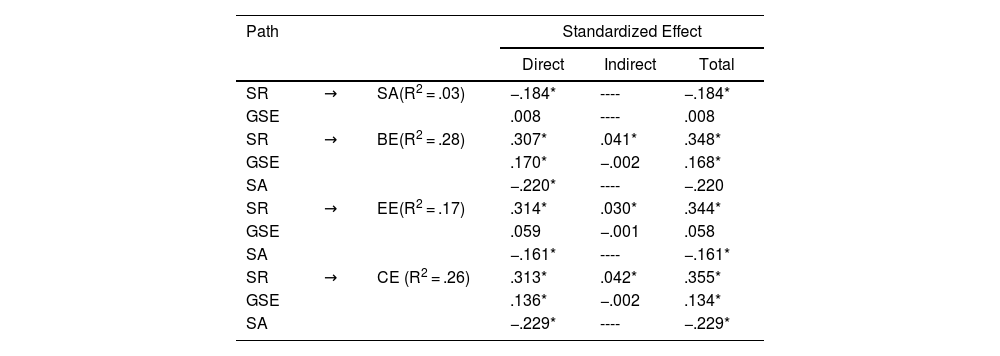Given that students maintain a continuous connection with their smartphones in their daily lives and rely on them for participating in distance education, it becomes imperative to explore the factors associated with student engagement, considering the mediating role of smartphone addiction in distance education programs. Although extensive research has been carried out on smartphone addiction, very little is known about it in the context of distance education. This study aims to explore the relationship between student engagement, smartphone addiction, self-regulation, and self-efficacy among distance education students in online learning environments. This cross-sectional study was conducted in Türkiye. Data were collected via an online questionnaire from 1514 university students (n = 842 females, n = 672 males; Mage = 33.11, SD = 10.09) enrolled in various distance education programs in Turkey, specifically those undertaking synchronous online courses, through an online questionnaire distributed via e-mail. Path analysis modelling was used to test the hypothesised model. Maximum Likelihood Estimation was used as a method for estimating parameters in path analysis. The findings of this study indicate that self-regulation had a positive impact on student engagement, while smartphone addiction had a negative influence. Importantly, smartphone addiction acted as a mediating factor, weakening the relationship between self-regulation and student engagement. No significant correlation was found between general self-efficacy and smartphone addiction. These results highlight the significance of interventions focusing on self-regulation skills and promoting healthy digital habits to enhance student engagement and addressing smartphone addiction is crucial for enhancing student engagement in distance learning environments.
En la actualidad, el alumnado mantiene una conexión constante con los teléfonos inteligentes y depende de ellos para la educación a distancia. Por tanto, resulta primordial analizar los factores asociados a la participación de los estudiantes en este tipo de educación, considerando el papel adictivo que desempeñan los teléfonos inteligentes. Aunque la adicción a los teléfonos inteligentes ha sido extensamente investigada, se dispone de escasa información sobre este fenómeno en el contexto de la educación a distancia. Este estudio tiene como objetivo analizar la relación entre el compromiso de los estudiantes, la adicción a los teléfonos inteligentes, la autorregulación y la autoeficacia en la educación en línea. Este estudio transversal se ha llevado a cabo en Turquía. Se han recopilado datos mediante un cuestionario en línea de 1.514 estudiantes universitarios (842 mujeres y 672 hombres; Medad = 33.11, DT = 10.09; 56% mujeres) matriculados en diversos programas de educación a distancia en Turquía, específicamente aquellos que realizan cursos en línea síncronos. Se ha utilizado un modelo de análisis de trayectorias para probar el modelo hipotetizado. Se ha empleado la Estimación de Máxima Verosimilitud como método para estimar los parámetros en el análisis de trayectorias. Es importante destacar que la adicción al teléfono inteligente ha actuado como un factor mediador, debilitando la relación entre la autorregulación y la participación del alumnado. Por tanto, no se ha encontrado una correlación significativa entre la autoeficacia general y la adicción a los teléfonos inteligentes. Estos resultados resaltan la importancia de las intervenciones centradas en las habilidades de autorregulación y la promoción de hábitos digitales saludables para mejorar la participación del alumnado y, de este modo, abordar la adicción al teléfono inteligente, mejorando así la participación del alumnado en un entorno en línea.










